#I was praying for a subversion
Text
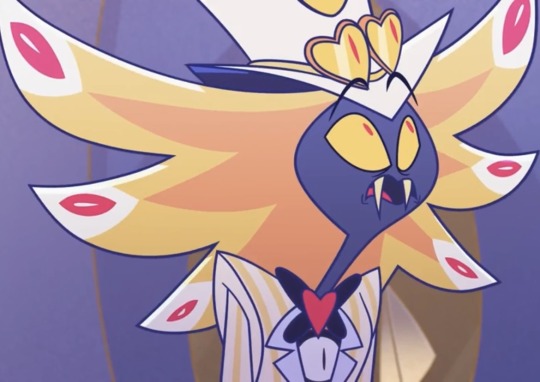
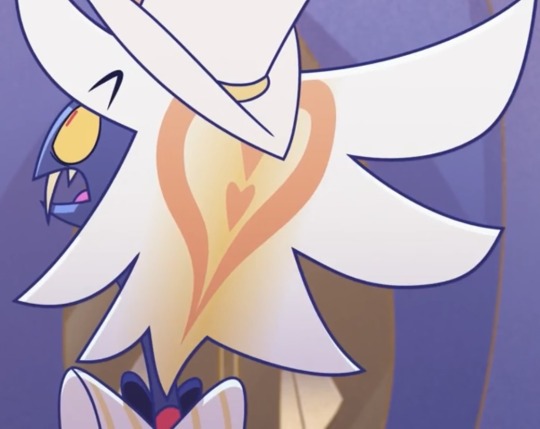
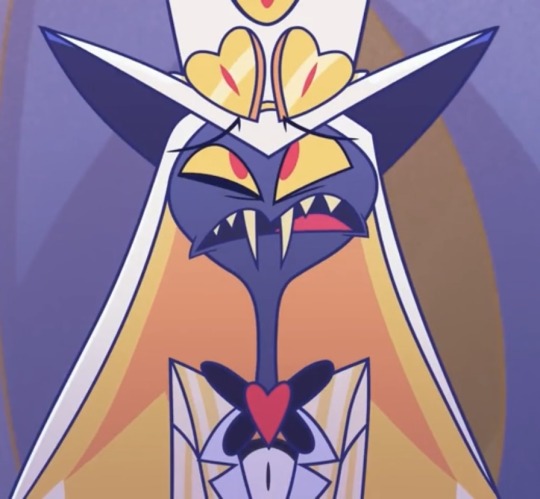
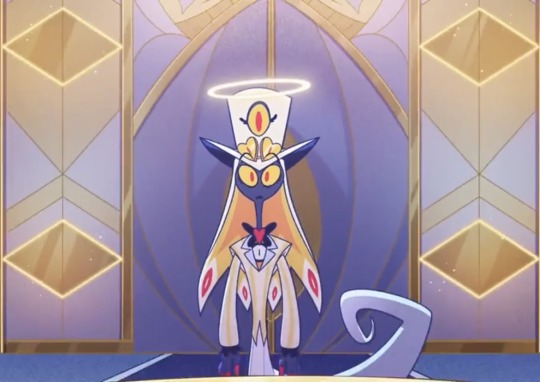
He’s fucking beautiful
#look it his eyes!!!!!!#what the fuck#he’s so pretty#I’m a sucker for too many eyes#I’m so happy he’s still here#but what the fuck#why#how#what#im squealing#but huh#I knew it was going to be him that died#I was praying for a subversion#and I guess I got it?????#sir pentious#hazbin hotel#hazbin hotel spoilers#hazbin spoilers
416 notes
·
View notes
Note
Why did God harden the Pharaoh’s? I’m in a Bible as Lit class and someone brought up “wouldn’t that be against free will,” and why did God let the Israelites stay it in slavery for so long. Why is God different in the Old Testament to the New Testament? I hope this doesn’t bother you, with all these questions
Okay, so there are several different questions here and I'm going to try to address them all. I'm sure I'll miss something somewhere, so other more knowledgeable friends feel free to add on. Follow-ups are also very much welcome.
First off, Bible as literature class! Yikes. I took a Bible as lit class for my English minor years ago and my experience was pretty much wall-to-wall frustration. It was mostly an exercise in coming up with the most transgressive reads on Scripture possible and that really upset me.
I hope that your experience is better than mine. However, assuming that the class is at a secular university, I'd still encourage you to be intentional about talking the things you cover in class over with knowledgeable Christians in your life. I certainly benefitted a lot from doing so, both in the sense that I got to vent a whole bunch and in that I got help contextualizing the secular perspectives within Christian scholarship.
That out of the way: The God of the Bible is the same in both the Old and New Testaments.
I do understand where you’re coming from. It’s not uncommon for people to find God kind of inscrutable in the OT when they're more used to reading the NT. I actually think that's a failure on the part of the contemporary church in the West; large swaths of the OT tend to be understudied among lay-Christians.
Systematic theology can help a lot here. I'm just going to hit a few really broad highlights, but I really can't recommend Wayne Grudem highly enough if you're interested in more in-depth reading. Lots of people start with Bible Doctrine, but my family happened to have a copy of his enormous Systematic Theology tome in the basement when I was in high school and I got a lot out of just poking through that a little at a time too. A few quick bullets though:
Across all the Biblical texts, God is love. He glories in kindness to his people, whether it's in the covenant with Abraham, the Exodus, the faithful ministry of the prophets, Christ's ministry/death/resurrection, or the promised coming of his kingdom.
God is holy; he gives the Law to the Israelites so that they can approach his holiness without fearing for their lives and he sent Jesus so that we can do the same. Both Isaiah and Peter react with fear and awe in the face of God's holiness.
God is just. By virtue of his holiness, he cannot allow sin to go unpunished. As modern westerners, we often chafe against this but has any of us experienced justice that was actually pure? Justice is a form of faithfulness, and the same God who sent his people into exile poured out his wrath on his own son in our place. He has promised that one day, every evil will face his perfect justice.
God is faithful. He keeps his Covenant with Abraham even unto the cross. In the OT he is faithful husband to an adulterous people. In the NT he tells us that when we are faithless, he remains faithful, for he cannot deny himself.
Lots of other characteristics but this answer is going to be long enough as it is. The only way to get a real sense for the continuity within the Bible is to read the whole Bible with an eye towards the continuity.
The reason that God is more approachable in the NT than the Old is that he became human. In the Incarnation, all of that holiness and justice and faithfulness and love that was God came to earth in our perfect likeness so that he could live beside us and die for us. God is certainly easier to approach in light of Christ's work, but he is utterly the same as he ever was. Read the Transfiguration and tell me that isn’t the God of Mount Sinai. Read John 1 and tell me it doesn’t remind you of the end of Job. Read the Gospels, Hebrews, and Revelation and play spot-the-OT-parallel. It's beautiful.
Why did God leave his people in slavery for so long? You could ask the same question about the Babylonian captivity and even about why Jesus waits to return and finally defeat Death. Why does he wait? Why let his people suffer?
Well. God is sovereign and he only permits evil to the extent that it ultimately accomplishes the very opposite of what it intends. Because the Israelites were slaves in Egypt, the Exodus was able to occur. The Exodus glorified God in extraordinary fashion, both among his own people and to the peoples of the ancient world. It was also a necessary type and precursor to Jesus's work on the cross. I don't think it's an overstatement to say that redemptive history rests on God's work in the Exodus, which is itself contingent on a period of slavery in Egypt.
“How long, O Lord” and “Come Lord Jesus” are the same sentiment in different words. We are still in exile, even now. We are chronologically exiled from the place where we belong, the New Jerusalem, and we mourn because we live in a fallen world in which sin and death can still hurt us. We can ask, just as the Prophets once asked, why God waits to vanquish the Enemy, extract suffering from the world, and restore our years that the locusts have eaten. And in each case (the slaves in Egypt, the Babylonian captivity, and the period of waiting for Jesus to return), the answer is that God does not fix it yet because He is doing something bigger!
Regarding Pharaoh's heart: this is basically a question of human nature. The easiest way that I can articulate it off the top of my head is using Augustine's fourfold state of man:
Prior to the fall, man was able either to sin or not to sin (posse peccare, posse non peccare)
The natural state of man after the fall is one in which he is unable not to sin (non posse non peccare). This was Pharaoh's state.
Following the work of Christ, regenerate man is able not to sin (posse non peccare)
In eternity, glorified man will be unable to sin (non posse peccare)
When we talk about man's will, we must acknowledge that our wills are subject to our nature. In other words, Pharaoh was a natural, fallen man. His nature was inherently sinful and his heart inherently hard.
What we've got here is sort of a "Jacob I have loved but Esau I have hated" situation. Pharaoh, in his natural state, had a hard heart and a natural enmity with God. God did not intervene to give him a heart of flesh. My people I have loved, but Pharaoh I have hated.
Not a perfect parallel, but I think it serves its purpose. The point is that God's sovereignty isn't in conflict with man's will, since our wills are a function of our natures. Man behaves however his nature inclines him to behave at any given time. We call this free will; however, God is entirely sovereign over all of it.
This is definitely a long, messy answer, but like I said, feel free to continue the conversation. I've got some biochem to work on, but I'm always happy to talk theology :)
#Secular Bible as lit classes really are a quagmire#mine was basically where I decided that I straight up do not care what non-Christians have to say about the Bible#(in the scholarship sense I mean)#if you don't have skin in the game then i couldn't care less what you think on authorship/characterization in genesis/weird subversive take#on ruth/Job being internally inconsistent/God's gender/the purpose of the parables/whatever other nonsense#sigh#and like. i had a good theological grounding to be able to push back on the BS nine times out of ten#my prof actually called me the most engaged student she'd ever taught which was pretty hilarious#but i was FURIOUS on behalf of the other Christians in the class who by and large had relatively shallow foundations as far as i could tell#like one girl was seriously doubting whether God was good when we did the prophets because of the way it was presented#i went to the prof's office hours one time to pick a fight (long story) and she told me that she's had numerous students over the years#that renounced their faith after taking her class#i spent the whole semester praying for all the names on the class roster#ugh i could rant about that class forever#meanwhile! no discussion of the ACTUAL literary merits of the Bible which are awesome!#the poetry the reoccurring motifs the deft use of metaphor the beautiful elevation of theology to art#i wanted to talk about that!#and that wasn't what the class was about#this was years ago and i'm still mad. sorry#maybe that'll be a separate post one of these days#ask me hard questions#only thou art holy
41 notes
·
View notes
Text
The subversion of faen fatale in Last Twilight; and why I love it
Can I just talk for a moment how much I appreciate P'Aof dismantling faen fatale tropes, as well as the notion of 'guys and girls can't be close friends' that is so prevalent in Asian society? Because not only did he do a fabulous job with Ink in Bad Buddy, but he's going above and beyond with it in Last Twilight. We have Gee, who could have so easily been someone who was interested in Day, and come in between their relationship (I was praying for her to not turn out to be a faen fatale when she was introduced). But instead, she's a great friend to Day, and she helps him regain another piece of his life by pushing him to join her at the bar. And then we have Porjai. She's Mhok's ex girlfriend, and the narrative has presented chance after chance for her to regain feelings for Mhok, and present problem for Mhok and Day in so many different ways, but none of them were ever taken.
And part of this feels very intentional to me. Showing us two female characters that could have very easily become barriers to the relationship, they didn't. We see it in the preliminary interactions between Day and Gee, where there's some time where Gee's character could have easily gone one of two ways. And you will not believe how immensely relieved I was when the show made it abundantly clear that Gee is a friend to Day, and nothing more. Similarly, Porjai is introduced to us as Mhok's girlfriend, and later as his ex. It would have been so easy for her to 'catch feelings again', like when Mhok comes to her aid with her ex (forgot his name, won't bother reminding myself). I feel like the show is trying to put the point forward that guys and girls can be friends, and that the girl doesn't always have to be a homewrecker.
And let me tell you this, I absolutely adore that P'Aof is doing this. The trope of female homewreckers, (or faen fatale as we like to call them) is extremely prevalent not only in bls, but in asian media in general. I've seen it everywhere, from bollywood movies to add drama, to serials that have been running for half my lifetime, to keep the viewers watching. I've watched it enough times to have a genuine hatred of it. There's a number of issues with the trope that I'm not going to get into right now, but I'm sure you're all familiar with. But the greatest point is, that it often takes away from a good story. It's a tired trope that serves only to add drama and disinterest the viewers from the story. Last Twilight (and Bad Buddy too) has had a very concrete storyline from the start. The purpose and aim of this story have been clear from the beginning, and in the most recent episode, the show has started to dig a little deeper into Day and Mhok's stories, relationship, and shown us how they're growing together. A faen fatale would absolutely ruin the slow, delicate journey these two are on of growing together, which is where I come to August.
Honestly, I was a little afraid when I realized that Day liked August. Because Day and Mhok have been slowly, but surely growing closer, and they're slowly letting down walls built up due to grief, and loss. But August only serves to help us further understand Day. I'm struggling slightly to put this into words, but in the single episode we had with August, I've learned so much more about Day, and how he works. And, his introduction also highlighted Mhok's caregiving instinct once more, his tendency to always put Day first. There are rare instances when introducing a past crush does so much for a story (another being Bad Buddy, P'Aof the wonder that you are), and I'm absolutely eating this up.
The last scene absolutely crushed me in a way that only Ep 5 [4/4] bls by P'Aof can. Once again, the resubversion of the Faen Fatale trope. When I first saw August, my first reaction was expecting faen fatale, 'and now he's going to take away Day's attention and Mhok's going to leave the flower and we'll all be sad". Well, the last part happened but it was so much more heartbreaking the way it was done. Once again, proving how much better a story can be without the trope that with. I won't lie, I'm still scared about how the knowledge that Day likes August will impact Mhok's actions toward Day. But, it's more of a fear for the characters, and less of a fear for the narrative, as in I'm not afraid that it will take away from the story.
Bad Buddy holds a legacy for subverting an innumerable number of tropes, and I'm glad to see that Last Twilight is holding it's own in the department too. The purposeful subversion of faen fatale made my heart incredibly happy (have you noticed how much I hate this trope? You probably have. I'm sick of it. Most Indian kids are)
Side note- I've seen a number of posts ghostshipping Gee and Porjai, and while it may not be very plausible, we did get InkPa, so it's never impossible
#i have a lot more thoughts but a theyr all extremely incoherent#this was my attempt at making sense of some of them#but seriously tho#p'aof is an absolute frickin genius#its insane how well the entire thing is orchestrated#im seriously having extreme trouble describing my thoughts because of how incoherent they are#theyre not even in words my thoughts about this show are in vibes and feelings#if that makes sense#it doesn't. i know#last twilight#last twilight meta#last twilight the series#faen fatale#subverting tropes#aof noppharnach
142 notes
·
View notes
Text
20/?? Special delivery
(Previous) | (Index) | (Next)
⛬
We return to a movie that has never been to medical school, Prometheus.

Here it is. The scene that everybody remembers because it gave a fair few people the screaming heebies. This is their version of the chestburster scene–except for the less impactful, literal version of the chestburster scene we’ll get later, I mean. This one, though, this one, they got it right.
Content warnings for gore, nudity, nude gore, exhaustive discussions of the place of chestbursting in franchise history.
But first! I saw a tag with a desire to see the scene with David and the star map. To spare everyone from watching the rest of the movie to get there, here it is!
youtube
[See previous post for lengthy description of the events. I didn’t talk about the music in this before though! It really adds to the sense of wonder in this scene. It reminds me of Daft Punk’s Overture to Tron Legacy (2010), another beautiful and flawed movie. Given the modern use of temporary music in editing that definitely sneaks into what directors demand of scores, there’s a chance this was a direct influence. In terms of the “oh wow, space!” feeling it gives me, I’d also mention the Star Trek TNG opening theme.]
Anyway! On with the horror.

In Alien, the creature’s life cycle was developed by writer Dan O'Bannon, who had two major ideas for its early appearances: sexual, reproductive threat directed at a male character, and Crohn’s disease. O’Bannon had Crohn’s, and he said that inspired the idea of a critter chewing its way out of a man’s guts.
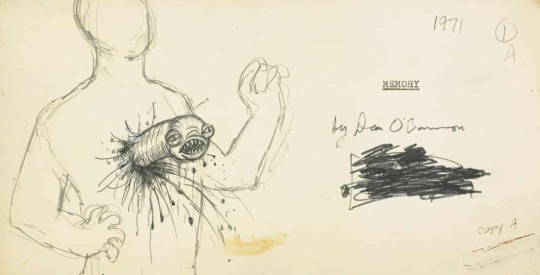

That personal connection has been lost through subsequent media, in part because the series has continued to use the same creature and the same method of killing, minor deviations like in Covenant and tasteless ones like AvP Requiem notwithstanding. The chestburster is a thing that can only ever really work once in a movie. The first time is relatively drawn out, made a setpiece of the movie, and is a horrifying plot twist for anyone who goes in blind. After that? Drawing it out may risk becoming meaningless gore or boring, so most movies have chosen to just have the little bugger pop out within seconds. It’s the sideshow before you get to the main event, despite being the iconic scene of Alien.
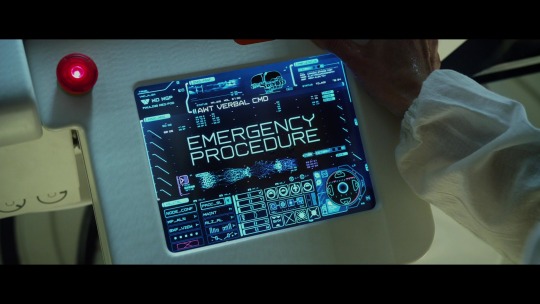
Prometheus’ equivalent scene wins back a fair amount of tension by altering the details of the event, if not the general arc of it. It certainly hammers on the reproductive horror aspect, but loses the original subversion of targeting a male character. Which is a shame, because male-targeted reproductive horror is still boundary-pushing. From the world of horror gaming, Outlast: Whistleblower produced some notably panicked reactions from male players when they encountered the emasculating, specifically reproductive threat of Eddie Gluskin. (Content warning for gore, death, forced feminization, misogynistic language, censored nudity.)
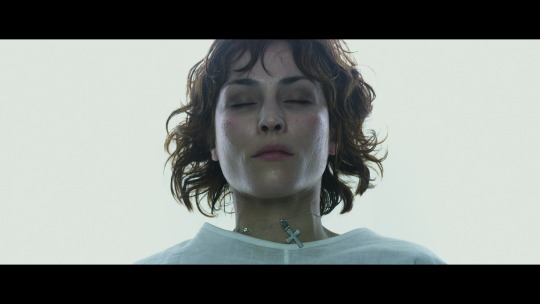
Regardless, we have The Chestburster Scene again, but now it’s in the back half of the movie, and happens to the main human protagonist.
I find it very odd that this movie is so self-consciously iterating over things that were first done in Alien. It’s like watching a devout Catholic pray at the Stations of the Cross.
Speaking of crosses

Before we get to the main event, there’s the first actual attempt at character work between David and Shaw in the movie, as we’re in the final act. David confiscates Shaw’s cross as she wakes up from her post-boyfriend-barbeque faint. “It may be contaminated,” he says.
Shaw’s christianity is one of the few character traits in the film that ties into one of the themes, and has its own arc. She’s giving up her cross to the person who killed her partner, a metaphor for a crisis of faith which is so blatant as to barely be a metaphor at all. And, given the general arc of how these things go, means she’s going to get it back at some point. The context for it is going to be confusing and disappointing, frankly.

And it’s especially weird given the other metaphor going on simultaneously: David runs some scans on her, and declares she’s three months pregnant. This is a non-virgin virgin pregnancy. She is Alien Mary. This, then, is the narrative reason why Shaw is infertile–so that she could be the Mary figure, and, more practically for the plot, have foreknowledge that something was wrong.
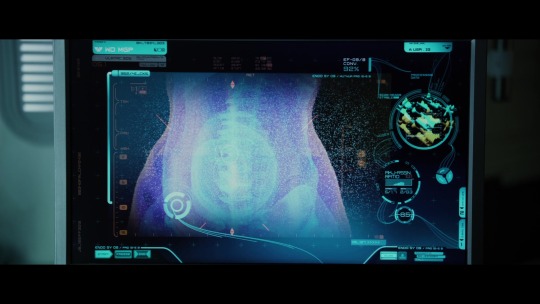
Except it really didn’t have to be that way to make this work. While christian allegory and the creation of life are themes in this movie, Shaw’s infertility was handled with zero grace. And honestly, the movie could work without it–Shaw and Holloway did not have romantic chemistry, as far as I could tell. Lean into that! Just say they haven’t had sex in ages. This scene would actually flow better, because Shaw explicitly objects that she only had sex with Holloway “ten hours ago. There's no bloody way I'm three months pregnant.”
Which again hammers in how stupid fast this movie has been racing its characters toward their doom, but I’m immediately distracted by David pronouncing “it's not exactly a traditional fetus.”

It certainly isn’t. It’s an alien squid, placed there by the holy spirit of black goo. She’s all set to give birth to Squesus.
I think that’s the only worse way he possibly could’ve said it.

David, frankly, gets some of his worst dialog of the movie here, because he is infected by The Plot for a bit. “It must feel like your God has abandoned you,” he says, after sedating her, “to loose Dr. Holloway after your father died under such similar circumstances.” Which leaves one momentarily with the wild mental image of Dad Shaw sacrificing himself to a flamethrower-welding corpo, but no, David means ebola. David found this out via that dream-watching tech that exists solely to be a mildly unnecessary plot point. Blessedly, this is the last time we see any mention of it.

It’s very strange, how the movie is stuffed full of plot and edited so tightly around the plot that characters barely have room to breathe, yet what it prioritizes as plot-relevant is so scattershot. This failing is also inflicted upon the part of the otherwise very effective Chestburster: The Prequel scene.


Shaw attacks the people who come to take her away to cryo, running in her underwear to the PAULING MED-POD the movie very loudly announced earlier, so that you wouldn’t forget it exists. She tells the PAULING MED-POD that she needs an emergency caesarian. The PLOTPOINT MED-POD informs her that it’s only formatted for male patients.
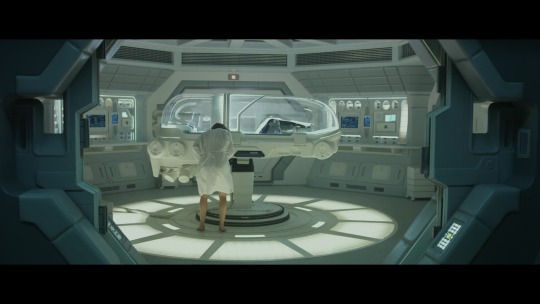
I’ve seen many people complain this makes no sense. It’s in Vickers’ quarters, why would she have an expensive medical device that she can’t fully use? Others counter that no, it makes sense, because the med-pod was actually installed for Peter Weyland, thus justifying its male specificity. He’s a selfish bastard, he got it for himself, plot hole avoided.
…Except that doesn’t address the more fundamental problem: What does this add to this scene, to balance out the fact that the audience is now distracted by this information? It slows Shaw down a bit as she figures out how to cue up a foreign body extraction from the abdominal cavity, adding to the tension. But you don’t need that to be what draws out the scene. Maybe the PAULING MED-POD has a slow boot-up sequence. Maybe someone follows her there, and she has to fight them off, possibly killing them in her panic. A dead body in the room would solve an actual logical problem with a later scene.
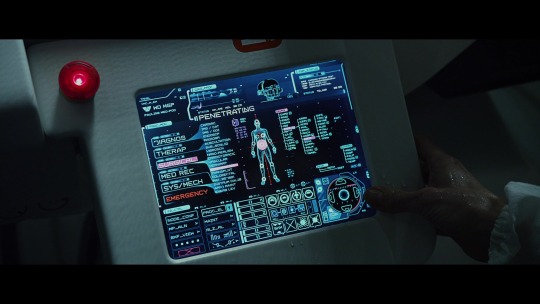

It’s frustrating, because the pacing of this scene is actually excellent, as is its premise. Shaw has to forego anesthesia and make do with self-administered local painkillers, because the prosthetics and CG teams have done a bang-up job making her stomach writhe unpleasantly, making it very clear that whatever’s in there is mobile enough to be a danger to her, even if it’s removed.



The pods instruments are mostly CG, but its combination of unhurried routine and abrupt, industrial roboticism adds to the uncomfortable nature of the scene. Sound design is also important here, with all sound effects well-chosen, and mixed to imply claustrophobic closeness and how trapped Shaw is.


The creature itself? Eh. It’s a slightly phallic squid, and squids were already slightly phallic to begin with. They added on a slightly vaginal mouth, which is also a lateral move--squid mouths already look quite a lot like an unworksafe orifice with a beak tucked away in it. Unless you're looking at Promachoteuthis sulcus, whose inner lip structures fold into patterns that look distressingly like human teeth.

Honestly, this is freakier than the actual prop. Good job, Promachoteuthis sulcus. You're only 25 mm long, and a delightful tiny terror.
...But the fact that Shaw’s stuck in the pod with her flailing squid-child is what actually adds another minute of fear and wince-worthy pain, as the almost comically brutal medical staple gun closes her incision and the pod slowly opens up.

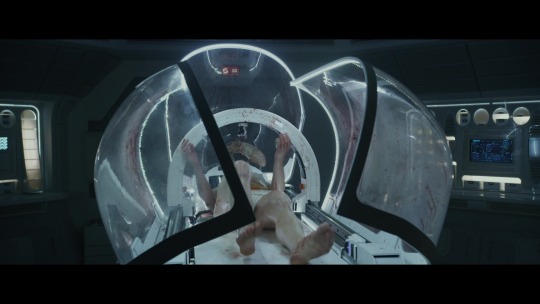
She tries to kill it with what appears to be a soothing mist of decontamination spray. This is the one other stumble of the scene, because it’s just… I mean, look at it.

It’s just been spritzed with Febreze. There’s nothing that leaves you wondering if the thing’s still alive for later, you know it’s still alive.
But overall, a well-done scene. The standout horror scene of the movie, which is light on scares. That sparsity wouldn’t even be worth mentioning if the movie were going for slow tension, but with its strange blend of existential quandaries and unremarkable horror tropes, it takes a very strong, singular scene to feel like the tension has actually paid off. I don’t think it completely balances out the deficits of the rest of the horror, but it very nearly manages it, and does manage to be memorable.
Next time: An entirely underwhelming horror scene, and the movie takes another swing at having themes.
⛬
(Previous) | (Index) | (Next)
⛬
Citations for alt-text rambles:
https://www.theguardian.com/film/2019/aug/30/memory-the-origins-of-alien-review-francis-bacon-greek-myth-dan-o-bannon-sci-fi-classic-film
https://www.stanwinstonschool.com/blog/aliens-chestburster-mechanism-behind-the-scenes
https://avp.fandom.com/wiki/Seegson
https://stackoverflow.com/questions/3314219/how-do-u-v-coordinates-work
https://en.wikipedia.org/wiki/Surgical_staple (medical gore cw)
https://sites.uw.edu/pauling2020/
https://www.paulinamarket.com/
Overflow Ramble #1
A shot of the screen on Chekhov’s g–I mean the PAULING MED-POD, showing the text “EMERGENCY PROCEDURE”, and that it is “AWT VERBAL CMD”. The med-pod turns out to be a Weyland product, because all corporations in Alien movies are either Weyland, Yutani, or Seegson, if you’re particularly unlucky (cite 3).
They made the mistake of putting more actual words on here, and so I’m squinting at the top right corner at “CARDIAC STRESS TEST”, “ELECTROCARDIOGRAPHY” AND “MECH ALGN TCH”, which means the pod appears to think she needs to have her heart checked or her wheels aligned.
But what I find funniest is that there’s coordinate sliders in the center bottom: X/Y/Z and U/W. You know where I recognize that from? 3D modeling. U/V/W are used as an alternate coordinate system in that context (cite 4). Somebody was designing this, thinking “well, we need more buttons. Where can I get more buttons?” and then looked at the horrid mass of options and sliders in their modeling software and realized they had the answer.
Overflow Ramble #2
A close-up of David’s hands, holding a sample container and placing Shaw’s necklace inside. Two details, one of them insane, the other just plain funny: First of all, this is a different set of hands than the one when David was messing with the black goo–there was a small but notable blemish on the fingerprint that wasn’t there, proving once again that hand and arm doubles are one of the odder things you don’t think about in film production.
Second: The container is turned so that the label on it is facing away. This allows you to see the necklace, but it also highlights a completely flat Braille label, reading “PN#ZTZouSthe#Z”, which is obviously very informative.
But the real reason why the label is facing away is because it almost hides the fact that the label says “PRODUCT CODE” on it, which means he may have just put Shaw’s necklace in an empty peanut butter jar.
⛬
(Previous) | (Index) | (Next)
⛬
#Prometheus 2012#Prometheus (2012)#finally some well done scenes#though the plot still does not leave them unscathed#Youtube
34 notes
·
View notes
Text
Unconventional Detective Games
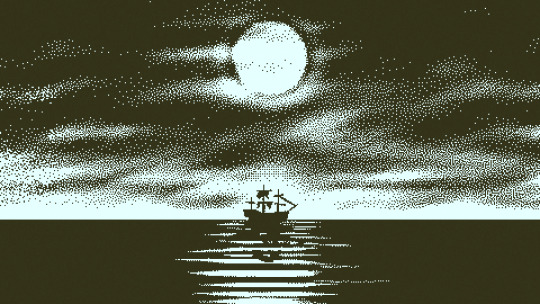
Return of the Obra Dinn, 2018
The maritime mystery game Return of the Obra Dinn by Lucas Pope is almost entirely subversive for a detective game. Everything in the game from its core premise to hyper stylized presentation, is all ambitious and experimental. Every person aboard the Obra Dinn has mysteriously died and you assume the role of an insurance investigator piecing together the horrific events using a magic watch that delivers to you a front seat viewing of a vignette of each person’s demise. Using these dioramas of death, you are charged with recording the manner of death of each and each crewmember and passenger aboard the ship.
Return of the Obra Dinn and its addictively satisfying detective puzzle gameplay left me hungry for more. Playing the game instilled in me a deep love for a good mystery and a desire to solve them. While I love games like Disco Elysium, which stars detectives as its protagonists, the investigation was never really the point. Moreover, a love for the unconventional detective was entrenched in my heart and as an interactive medium, video games are perfect for aspiring would-be detectives.
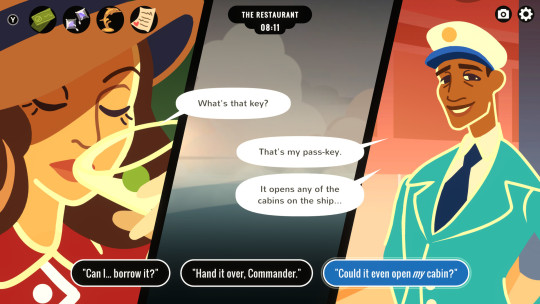
Overboard! , 2021
The year is 1935, aboard the S.S. Hook, Veronica Villensy throws her husband overboard under the foggy shade of night. In Inkle’s devilishly clever puzzle/visual novel, Overboard! you have eight hours before reaching the ports of New York and in that limited time you must relieve yourself from suspicion and guilt for your husband’s death at any cost. It’s a sort of anti-detective puzzle about getting away with murder which forces you to learn your fellow passenger’s schedules, plant evidence, and be consistently careful with your language lest your words betray you much later.
The DNA of time loop games such as Majora’s Mask and The Sexy Brutale is woven into the gameplay loop of Overboard! It’s a fairly short game taking around 2-3 hours to finish the story but at the benefit of allowing an immense amount of player agency. There is a wide variety of solutions to evading the mighty hand of justice, you are free to travel around the ship on a whim with no direction from the game itself. The only hint system is visiting the chapel and praying to God which is both cleverly diegetic and hilarious.
The nonlinearity of your objective incentivizes logical thinking and experimentation. The puzzle is rewarding much like learning each map and NPC routines in the Hitman: World of Assassination trilogy is. At first you clumsily trip over your words when Major Singh interrogates you but eventually you can get away with murder in style along with netting some pocket money from the life insurance if you pull it all off just right!
The nonlinearity of each puzzle in Overboard! is incredibly refreshing, it just feels organic and natural. Going achievement hunting in this game is its own little puzzle and I still haven’t figured out some of the little secrets it hides from us. It’s a game I can’t put down and haven’t yet been able to stop thinking about and I really recommend giving it a shot since it’s only $15 and only $6 if you catch it on sale.
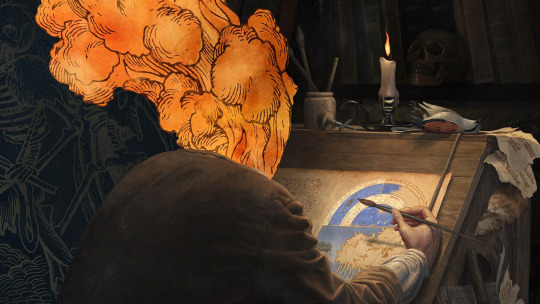
Pentiment, 2022
Obsidian Entertainment’s Pentiment was my favorite game of 2022 and enraptured me for long nights as I obsessed over its rich dialogue and gorgeous medieval illumination manuscript inspired art. So much love and research was put into the historical setting, it takes place in 16th Century Bavaria within the town of Tassing is filled with life and character. You play as Andreas Maler, an artist working in an abbey on a hill and whilst attempting to finish your masterpiece, your co-worker and friend, Brother Piero, is falsely accused of the murder of a wealthy Baron who was staying in town. You are sprung into action as you only have a limited amount of time to clear Brother Piero’s name.
You are given a limited amount of time to wander around town, attempting to conduct interviews, deduce motives, and eventually gather enough evidence to bring the culprit to justice. Because of the impending trial, time is ever so precious in Pentiment and you will never have enough time to do everything you want at your leisure. Every moment dwelling on conversation or recreation is time you could have spent digging for answers. In order to pin a suspect you must hone in on what you think is most beneficial for your case like a true detective.
Brother Piero’s freedom is always at the cost of another’s conviction, in Pentiment you must push the blame onto someone else. During your investigations, you find that Sister Matilda, a nun at the abbey, had been assaulted by the late Baron many years ago. This is one of the clearest motives in the game but most physical evidence points in other directions, all the while every nun in the abbey will assure you of her innocence.

Saint John's Eve Festival Bonfire
Convincing the archdeacon (the head of the trial) of Sister Matilda’s guilt is perhaps the easiest of all the suspects to accomplish and Pentiment will not tell you outwardly that Matilda didn’t do it but it doesn’t have to. In a clever subversion, the game never tells you if you caught the culprit in the end. Pentiment, brilliantly, left me to wonder if I made the right choices as the totality of the lethal consequences of my actions weighed on my mind. You can easily convince the archdeacon of someone’s guilt but are you able to convince yourself?
The brutality of the executions should not be understated. You look on helplessly as someone you convicted meets an unwieldy end as they plead, cry, and eventually die. The executioner’s sword rises and falls as it lodges itself into the neck again and again until the head breaks free from the neck. Whether you like it or not, your choices matter in Pentiment and the consequences stare you down with a harsh disposition.
While playing Pentiment I was continually reminded of a line from Rian Johnson’s murder mystery film Knives Out. The titular detective Benoit Blanc (he’s so me by the way) notes that, “...the complexity and the gray lie not in the truth but what you do with the truth once you have it.” The complexity of truth is captured beautifully by Pentiment. In many regards it is a conventional mystery but by weaponizing the player’s need for clear answers it infected my mind for many hours after the credits rolled along with the minds of many others. There are fierce debates and chatter surrounding who really did the killing. Pentiment wasn’t as well talked about as it deserved, with all the games releasing it was overlooked by most. Well, it isn’t exactly for everyone but for the price of $20 it gave me a wealth of dialogue to mull over and wonder about.

Phasmophobia, 2022
A multiplayer ghost hunting spookfest is not exactly what you’d think of when discussing detective games but Kinetic Game’s Phasmophobia is deeply investigative by nature. Intense inspection is at the beating heart of the game with an important twist. Where ordinarily a detective chases after a suspect after the fact, here your suspect is reacting to your every move and can (and will) kill you on a whim. In the game you and up to three other friends venture into a haunted house and gather evidence and clues to determine which of the twenty four ghosts in the game is currently residing in your location.
You and your team will wander out of the safety of your van and into cold, darkened rooms to find clues by checking thermometers, speaking into spirit boxes, and throwing salt all over the floor in hopes of getting the ghost to step in it. Not only can you gather evidence with your camera and UV lights but another layer in your investigation is the behavior of the ghost. Knowing how aggressive each ghost is or how fast it is, is a tremendous asset in your deductive arsenal. The more you know, the more you can whittle the possibilities down until you have your culprit.
But finding the ghost and gathering evidence is just one thing, surviving the ghost is another. Being in the dark and bearing witness to paranormal activity will deplete your sanity and eventually the ghost will target you for a hunt. The front door slamming shut marks the beginning of a hunt, the ghost will manifest physically and chase you down and kill you if you don’t hide in time.

Corpse of my friend, deceased. Moments before I run out of the house in terror.
Phasmophobia is a dangerous balancing act of facing your fears by delving into the darkness in order to find clues and trying desperately to find the ghost type as fast as you can so you can get the hell out of there. The reactivity of the ghost keeps you on edge as you wander the halls gathering data. Speaking into the spirit box may prompt a raspy whisper into your ear or the candle you just lit may be blown out moments after. More interestingly though, is the voice recognition AI that takes advantage of the communication players rely upon. Everything from saying you’re scared to a simple curse word can lead to the ghost favoring you as prey. Even players who stay in the van for too long get targeted by the ghost!
Within Phasmophobia is one of the most unique investigative experiences on the market and definitely a one of a kind multiplayer experience. The comfort of having a buddy to share your terrors with is stripped away when they stop responding to your radio! It’s truly unlike anything I’ve ever played and the developers are constantly updating it, two big thumbs up from the afterlife.
The satisfaction from my first time getting away with murder in Overboard! and the despair when I find out I had the ghost type completely wrong in Phasmophobia are some of my most memorable experiences in gaming! And Pentiment proved to be one of the most well written games I’ve had the pleasure of reading. I sincerely hope you check them out if you haven’t already! They’re all pretty cheap anyway. And once again begging for recommendations in the comments/reblogs so if you know any good, and hopefully weird, detective games let me know! Thanks in advance everyone and I’ll catch you on the flip side :P
-Ghost Emoji 👻
#organmart#om-ghostemoji#writing#video games#video game recommendations#detective games#return of the obra dinn#overboard!#overboard game#pentiment#phasmophobia
118 notes
·
View notes
Note
What would a different form of magic be that isn't witchcraft? I know this is probably a dumb question but I'm honestly just trying to learn 😅
This is what bums me out about people insisting that it's okay and not harmful to call literally everything witchcraft!
It's erased an entire world of magic!
People! Literally! Don't! Know! Other! Stuff! Exists!
So let me tell you from the bottom of my heart, Anon: this is NOT a dumb question. This is a really important question, and not enough people ask it, and that's how we get to people tagging literally anything nonwhite and/or nonchristian as #baby witch #witch tips #witchblr #witchcraft 101.
Witchcraft has, until very recently, been a term to denote bad, harmful, or malicious magic. This is in contrast to good, helpful, or benevolent magic.
In a community, you can have a cunning person who practices good community-oriented magic, and you can have a witch who practices stealing delicious milk from the teats of cows.
This implies that it is more than likely the good cunning person and the bad witch were more or less practicing the same variety of bioregional folk magic, just to different ends.
In this context, witchcraft is any application of magic which is culturally subversive or harmful.
But there's so much more to the story!
In the mid 20th century, there was a witchcraft revival movement in England. Long story short, small groups of people worked to create a cohesive religious practice which they claimed was authentic British witchcraft. These practices are called Wicca and Traditional Witchcraft (2 separate things).
These practices were mostly ceremonial, involving elaborate rituals, magic wands, four elements, circle casting/compass laying, and so on.
These magical practices fueled and were fueled by an exploding culture shift in the western world and became so popular that they dominated perceptions of, and understandings of, what magic was.
Witch stopped being a person who used magic in bad ways, and started being a word for any person who uses magic.
Unfortunately, this is a problem, because now we have one word being used too many ways:
On one hand, witch is still a word that to many people denotes an evil or bad person who uses magic in evil or bad ways.
And, on the other hand, witch is now a word that refers to practitioners of a modern British magical tradition and its offshoots and variations, regardless of that person's maliciousness.
And, on the third hand, because Wicca had become so danged popular, witch has become a word that is applied to any person who practices magic, whether or not their practice is British and whether or not it is malicious.
The topic is further confused because witchcraft is so personal that one witch's witchcraft may look nothing like another witch's witchcraft.
What witchcraft is exists, and must be understood, contextually. In modern usage, a person claiming they practice witchcraft may mean any of the following (not a cohesive list):
"I am Wiccan."
"I practice magic derived from the British witchcraft revival period, but I am not specifically a Wiccan or follow any particular system."
"I practice magic which isn't derived from that British stuff, but I believe the title 'witch' best fits my practice."
"I practice magic that isn't witchcraft, but I call myself a witch as a term of convenience."
"I practice magic and I thought the word for that is 'witch', but if I put some thought into it I might realize I don't think that label suits me."
"I do not practice magic or Wicca but I enjoy nature and I pray to the moon."
With a word stretched so thin, outlining exactly what is and is not witchcraft can be a bit of a chore. However there are things which we can pretty safely say are just down right not witchcraft.
Before we go on, it's vital to mention that witchcraft is a term people get to choose, or reject, for themselves. So if someone from the following traditions is like, "nope, it's witchcraft to me," you should listen to them.
Anyway, here are some things that are not witchcraft:
Jewish mysticism (I've even seen posts about straight up Judaism, not even mysticism, just like, Judaism, being tagged as witchcraft)
Voodoo
Pow-wow
Folk magic
Chaos Magick
Santeria
Palo
Ancestor veneration
Praying to saints, angels, Mary, etc.
Faith healing (for example, as seen in Evangelicalism)
New Age
Spirit keeping
Worship of any nonchristian god or goddess
Heka
207 notes
·
View notes
Text
CONTROVERSIAL OPINION ALERT 🗣️‼️
Jk anyways hot takes have always been kind of a drama-trigger for tbhk fans generally (though most takes aren’t exactly “hot” they’re either lukewarm or just bad), but most prominently on tbhktwt, which I don’t actively participate in. But I’ve noticed that every time one of those “what’s your unpopular tbhk opinion?” Posts gets popular everyone starts fighting and it’s kindof annoying. Which for a few reasons: they just like to argue when no huge announcements are happening to make sure the fan base stays alive, or someone just has a really bad opinion (ex the toxic nene post).
Now that’s not the point and has nothing to do with what I’m about to say but I thought it’d be a fun intro.
(tldr at end and also more concise points w/o the tired rambling)
Quick side note. I’m being super serious, these are all just opinions I possess but they don’t necessarily exist in a vacuum. I mostly just want to complain about a trope I don’t like, but I’m not die-hard about any of this. So take everything I say with a grain of salt
Mitsuba, Sousuke, and what makes a character interesting
(Mitsukou cameo 2 because staying on topic is hard)

After a while, I started to develop a bit of a dislike of Mitsuba, the fake one specifically
To elaborate: During Sousuke’s introductory arc (and the only one he’s in) despite the trope-y nature of his character, his opening up during the chapters and his pre-canon connection to Kou is what, to me, made me like him more. I personally cannot stand the “cute-boy but actually he’s really mean” archetype, and it really turned me off from him in general. But I continued through it anyway. I thought the subversion of it was nice, not having him on edge and actually have a somewhat heart-to-heart was nice. And then he died whoopsie
I liked the hell of mirrors, like a lot actually. At the beginning I really liked Mitsuba, but as the series went on the traits I disliked started to shine more than the ones I liked. His stoic act around Nene at the very beginning of the hell of mirrors was the peak I strived for, but it basically never appeared again. The gruesome horror of Mitsuba lost my interest as he began to behave more human, I think. Now really all of this just comes down to personal preference. I like subversion, so I liked how Mitsuba was at the very beginning, but I never loved him. And I know that the direction his character took was always going to be the same but some part of me prayed for some kind of miracle.
He’s not human, but he wants to be, and I liked the idea a lot. But I was never able to get invested because almost every time he was in a chapter I wanted to bang my head into a wall. The the sensitivity and tact of Mitsuba isn’t lost, but I feel like a lot of it is lost when he’s around certain characters. His interactions with Nene (with a few exceptions) demonstrates how he could be if he decided to tone it down on occasion, still irritating but y’know, not as much. This falters with Kou in specific though, as he is constantly flip-flopping between defensive and annoying. If he could learn to let his guard down a little, it could really go a long way
Speaking of Kou
They are peers, they knew each other, and now only Kou remembers. Great, love it. Mitsukou, now that’s where it gets a little complicated.
As true equals, I do love them. And I know “the fandom ruined it for me” is a ballshit excuse but it genuinely does this time ‘round, and I can give a few pinpoints.
1. The constant feminization of Mitsuba
Every fandom is guilty of this at some point, and tbhk is no different. Forcible feminization of one (typically smaller or younger) male characters because they act even somewhat effeminate. And I have a right to be upset! It’s my 2nd amendment right or whatever!
2. And in tandem, the over-masculinization of Kou
His ass is fourteen!!! He ain’t buff!!! he probably still squeaks when he gets scared!! Enter that scene where Dipper is singing ABBA in the bathroom and Stan walks in except it’s Kou!!
3. General disregard of canonical characterization
Mitsuba can absolutely handle himself I’m going to kill someone
IMO mitsukou only really works if there’s an underlying understanding that 1. They’re both stupid kids. 2. They’re peers, and wether supernatural or not they are in alot of ways equals. And 3. They’re both deeply flawed.
To add onto that, Kou is indecisive about values. He wants to be an exorcist but has gotten attached to every somewhat sympathetic spirit he’s come in contact with, showing that he’s far too empathetic for the profession. He claims to understand Teru’s view on the undead yet he holds his personal judgment over his brothers consistently, for better or worse (yeah IK hanako is the title character so obviously he has to be good so why would he die but I’m just trying to think about it more literally, y’dig?). Mitsuba (the fake one) is not, and never will be, he isn’t meant to last forever. Sousuke (the dead one) Left everything unresolved, even when trying after death, nothing ever came to any conclusion, not even with his mom.
They work alone, but not yet together. But they can, it’s not too late, if given care and some intense therapy, they could totally be awkward teen romance of the summer. But the cannibalism should probably be talked about b4 that
Overall I think the general populous of Mitsukou could really benefit by trying to understand their dynamics a lil better, but what would I know I’m no yaoiologist
TL;DR (and end notes don’t forget) Basically, I wish he kept the short-lived confidence he gained in the Hell of Mirrors. I wish his cutesy-mean attitude died after as well. I also wish he wasn’t nearly as feminized as he is. (He’s not 4,9 he’s taller than Nene and would most likely be (if he didn’t die, rest in rip) the same height if not taller than Kou). Also his dynamic with Tsukasa makes me uncomfortable, like deeply so, it’s kinda really weird. ALSO(also) I think the constant comparison to Hananene is weird because the same comparison can be made to literally 90% of the other ships, why is no one ever comparing them to Terukane? Or Aoiaoi? Or Sumi6 (actually I completely understand why not sumi6 but they’re literally all human x supernatural no one is special)
Anyway the point I’m attempting to get across (while sleep deprived) is that (to me) Mitsuba as a character just doesn’t tickle my fancy and I tried my best to explain some reasons why. if you don’t agree, that’s perfectly fine! No one is entitled to agree with me.
Sorry if bad grammar I,m moments away from death Uauuughhh ninja out
#hot cheese#jibaku shounen hanako kun#jshk#tbhk#toilet bound hanako kun#kou minamoto#minamoto kou#mitsuba sousuke#sousuke mitsuba#I’m going to eat a tire
16 notes
·
View notes
Text
I'm surprised by how much I like Kirin. Not saying he is flawless, but I basically like every layer he has and even his flaws.
The character's development they did for him was fast, but I didn't like this trope subversion less because of this. When I say 'fast' I mean that I basically started ep.5 thinking about how bad it was for Josh to be paired with the "Chad" after the trauma he had gone through, and I ended that episode sure that Kirin was my fav (boy) character and also my fav person on the boys' island.
So, some consideration in no particular order:
- either Kirin has a natural talent to spot signs of abuse, or he has more backstory than what we have been made aware of so far. He frowns even before he sees the red marks on Josh's chest, reacting only based on his avoidance. He says and does what's right, not only he stays 100% firm in his decision to believe Josh but he also state that decision aloud multiple times. I see backstory here and I want it.
- not straight. He has a not-straight energy that is incredibly big. He's the Sports Jock and the "Chad" but his backstory has no girls in it: we don't see him with a girl not even in a fragment; he's not pictured as an heartbreaker, which usually pairs really well with the archetype of the Conventionally Attractive Popular School Bully Captain; he could have been busy with practise, sure, but from the point of the writers I see this as a deliberate storytelling choice to hint at something (or at least I hope so)
- he's funny. I find him genuinely funny.
- he's the natural leader, but he is also kinda the group mom. And his attentions to the others are so casual and natural that you fail to notice them at first: how he hugs Bo on the cliff, how he cooks and shares food, how he always has an eye on the others. It comes so naturally to him and therefore I want to know more about the "dad part" he gets to play and his siblings
- he may be a "act now think later (or never)" kind of person, but he is not a bad person. I ended up thinking about "bad boy, good man" as the perfect quote for him during one of the episodes.
- I'm not excusing what he said to Ivan in the flashback, but I really see that moment as nuanced. He said awful things, no doubts about that, but what I see in that scene is this: a drunk and sad schoolboy caught in the middle of a breakdown whose first reaction is to firmly state he is not an homophobe/racist (not sure about which one he was going for as the sentence is cut off) and to refuse to repeat the insults Ivan is putting in his mouth. In other words I don't see him as a racist and/or homophobe who is ready to insult people and happy to do so given the chance; and I see this because he does not come up with bad words he was refraining himself from using but is glad to let out, he repeats exactly what Ivan was telling him to say; I don't see any joy in him as the words come out of his mouth, I only see a broken young boy who is being provoked in a moment of fragility. Also, surely enough Ivan and him have more backstory, otherwise Ivan's provocation is unexplicable: we haven't seen Kirin doing anything bad up to this moment, so I don't get why Ivan starts this provocation. Therefore I suspend my judgment on this moment (and on both Ivan and Kirin before the island) until I know more about their relationship and what led to that moment in the locker room.
- his interview draws a lot of parallels to Toni and I like this a lot
- I'm really praying they'll use this magnificent example of "Archetype: Chad" to subvert the 'boys will be boys' trope and to show us a boy who is stupid and impulsive and everything a 'boy' is, but is also inherently a good person.
ALSO why he is officially listed as "Kirin O'Connor" but everyone on tumblr tags him as "Kirin O'Conner"?
#the wilds#a lot of words#talking to myself#the boys#kirin o'conner#kirin o'connor#in a surprising turn of events i like kirin#the twlight of adam#kirin the wilds#characters analysis#characyer development#trope subversion
463 notes
·
View notes
Text
I present to you The Venerable John Boswell, who should be remembered by every church and every Christian who considers themselves “open and affirming.”

If you have heard of John Boswell, you've probably heard of his name in conjunction with words like "controversial" or "disputed." This is an absolute shame, because I've been getting to know him and his work over the last couple of months for a different project, and I've come to think of him as "my dead friend." According to an (alive) friend in religious studies, "a saint is just a dead friend who can pray for you," so I am presenting him in the form of a traditional icon.
Iconography:
"The Venerable": in one sense bitterly ironic, since Professor Boswell died young. On the other hand it calls back to the Venerable Bede, also a historian whose work has been "challenged."
Tongue of flame: a traditional symbol for the Holy Spirit. One of the traditional gifts of the Holy Spirit is the gift of "speaking in tongues" and the "interpretation of tongues." Professor Boswell spoke or read at least 17 modern and classical languages.
Harvard Doctoral robes: a symbol of his academic achievement and authority. Professor Boswell was educated and worked in some of the most prestigious institutions in the world, and was briefly the chair of the Yale history department before he had to step down because of his illness. Someone like Thomas Aquinas probably would have considered him a social equal. He was not "a single controversial historian" with a couple of crackpot theories.
Palm frond: a traditional symbol for martyrs. In a very broad sense, a martyr is someone whose death can teach us something, or is otherwise "theologically significant." Professor Boswell died of AIDS in 1994. HIV/AIDS is not "God's judgment upon sinners," as some conservative fanatics believe. It is a mindless disease that governments and other institutions (including churches) allowed to spread unchecked in gay communities for years, simply because they were gay. It was only when "respectable" people began coming down with it that medical research began in earnest and public health protocols were put into practice. It was, and still is in some places, a public health disaster even now that effective treatments for it exist. Professor Boswell was one of the vanguard of AIDS patients who died before effective treatments were available, and part of a generation of queer elders who should still be with us. He would be 76 years old in 2023.
"The crown of glory for me is with you": this is a line from "The Passion of SS. Serge and Bacchus," which Professor Boswell translated into English for the first time, which makes it widely available to people outside of small, elite academic circles. In the legend, Bacchus has been martyred and has appeared to Sergius in a vision. He uses this line to encourage Sergius to stay strong until they can be reunited in heaven. In another sense, the icon of Professor Boswell is encouraging the people who admire him to keep up his work. Keep digging up subversive, queer Christian history, and keep challenging him. We didn't stop writing English history after the Venerable Bede, and we won't stop writing LGBTQ Christian history after the Venerable Boswell.
Hagiography:
Professor Boswell, known as Jeb to his friends and family, was said to be remarkably kind, generous, funny, and sensitive. He was beloved by his students and respected by his colleagues. He became a devoted Roman Catholic when he was a teenager, and attended Mass daily. He was approachable and open regarding the challenges of being both gay and Christian, and was also openly critical of the Church in spite of (or perhaps because of) his personal faith. He challenged both religious conservatives, for obvious reasons, and also "enlightened secularists" whose dogma held that "organized religion," and Christianity in particular, was the root cause of all homophobic discrimination in the world. There are many people who would have preferred to let his life and work quietly slip into the past, and there are even some who have actively tried to erase him, but John Boswell will not be erased. In my opinion, Professor Boswell should be officially commemorated by every church that considers itself "Open And Affirming." This modern movement builds on work done by Professor Boswell, and he must be respected in all of his twinky, flamboyant, brilliant, and life-giving glory. He declared that queer people could know God without shame or self-censorship, and that the Church could be made to repent and welcome us as it once did.
Further Reading:
If you have a couple of hours, I recommend the single known video recording of one of his lectures: Jews, Gay People, and Bicycle Riders (1986). This is an excellent introduction to his work.
https://www.christiancentury.org/article/first-person/john-boswell-s-faith-lit-generation
https://qspirit.net/john-boswell-historian-gays-lesbians/
https://www.findagrave.com/memorial/17004797/john-eastburn-boswell
https://www.wm.edu/as/dean/boswell/about/index.php
https://lgbtqreligiousarchives.org/profiles/john-boswell
https://sourcebooks.fordham.edu/pwh/index-bos.asp
https://archives.yale.edu/repositories/12/resources/5188
38 notes
·
View notes
Text
I think we should keep something in mind this Christmas/holiday season. As the Christian narrative floats around, the white swaddled newborn plastered on billboards, and the focus on what's "sacred" and "holy" circulating through churches around the western world...
The body being "sacred" has nothing to do with some fucked white European idea of chastity or purity. It has absolutely EVERYTHING to do with making sure people are able to feed themselves and their children, not be straight up poisoned by pollutants, or fetishized and exploited for profit. Holiness has nothing to do with being clean or looking your Sunday best.
It was never actually about "purity" or "virginity" or "cleanliness". If it was, why the hell would Jesus have been crucified? The real historical dude said stuff that pissed off people in power so much they fucking merked him. Nothing pisses off agrarian feudal lords or modern capitalists more than telling the masses that they aren't simply morally justified, but on the side of GOD when they steal medicine and food for their children. If you don't believe me, I highly recommend reading William Herzog's "Parables as subversive speech", read about what theologians actually think historical Jesus was talking about all those years ago. Whether you believe in God or not, think religion is a plague or pray a rosary every night, I think keeping this in mind is like super important.
Christianity becomes dangerous and, in the opinion of this demon girl, blasphemous when it is removed from the context of its social cause, when it's co-opted by those in power and disarmed of the radical rhetoric that it was born from originally. I think that's exactly what we see in broader society. I think that an entirely rational response to this is to equate all of Christianity or even all of religion with evil... But I think there's nuance here.
To be clear, I stand with the satanists who support the fight for separation in church and state by chastising the corrupt institutions who have become the opposite of what they claim to espouse. I stand with the atheists who keep the naive theologians in check, and offer peace to the people who have been ravaged by the monster modern Christianity is to so many. Don't stop doing what you're doing. If Jesus was standing here today he'd be standing with you. You're fighting modern day pherisees out here and I'm for it.
Now, this is not to say there aren't problematic things that were always present in the Christian religion, of course there are. And they're quite abundant. I think Christians need to be very aware of that as well. There's nuance there. What I'm calling for here is a realization that the religion of the oppressed is not the same as the religion of the oppressor, and that the religion of the oppressed, when not stripped of its merit and co-opted by systems of greed, can be a force for good. And when we use that lens to look at this bizarre spectacle we call "Christmas", we can learn some interesting stuff.
What I'm saying is, if you're trans, gay, whatever, for the love of God, literally, please LIVE. Listen to your friendly demon izalith. By existing as who you are, you are sacred. Don't let the people wearing robes and claiming to be on the sides of angels and "God" tell you who you can or can't love, or what you can or can't be. If there is a God out there, and he's with those punks, then he's no god. I spit on his name. Angels are overrated anyways... It's the demons, the poor person who steals from Walmart to feed themselves and their children, the prostitute who is proud of their job and the life they work hard to sustain, the fat trans person who goes to Christmas mass in goth makeup... It's those people who the religion was originally made for. It wasn't made for the rich, the white, the straight, the normative. It was made for us. For all those people who are downtrodden, cold this winter, unable to buy food, scared and tired. Fuck that shit they used to traumatize us and belittle us when growing up. It's all lies and venom anyways. If no one loves and accepts you, this demon will.
#christianity#counter-culture Christian#some demon theology#blasphemy is kewl#jesus would scoff at whatever the hell y'all been calling Christianity. especially if we're basing that off the greek orthodox jesus#queer theology#liberation theology#religious commentary#religious trauma#trans#Christmas#tw: religon
15 notes
·
View notes
Text
the thing abt sydrichie that gives me hope is that the ship is just unpopular and unpredictable enough that the writers might just do it to be subversive. i pray this is how things go
9 notes
·
View notes
Text
I find it interesting how Muir keeps identifying characters with Jesus but then subverting it in the same breath. The previous books already had it but Nona really goes all in.
Most obvious you have Gideon who is the daughter of God. Except her very existence is already a subversion because she is a messianic figure not for the Empire but for Blood of Eden. A savior whose sacrifice will open the Tomb and -ironically enough- kill God. (There’s an argument to be made about how in this context Wake takes on the role of God instead of John, as she is the one knowingly killing her child to achieve salvation. Pyrrha calling her We Suffer’s “God” when talking about her in Nona could be another small nod to this reading. Though I am also intrigued by Wake-as-Mary simply because Mary is always revered as a symbol of ideal purity, womanhood and virginity- all of which Wake is very much not. There’s a crack theory about John-as-Mary between these two statements somewhere.) Also small thing here, but Gideon is at first meant to be sacrificed as a baby. So it would not be a willing sacrifice of an adult but a forced sacrifice without any agency. The person who gives her life with a sense of agency in this context is Wake, who knowingly dies for the higher cause ( so she’s kinda God-and-Mary-and-a-Martyr depending how you look at it. Love that for her.)
At the end of Gideon the Ninth Gideon does eventually sacrifice herself in a way that is more in line with a Christ-like figure in Empire, as lyctorhood itself holds connotations to communion which is again linked to Christ’s sacrifice. However -and I find this part really interesting for all the potential it holds- Harrow ultimately rejects this sacrifice, refusing to let Gideon die for her sins mistakes.
In Nona we see her resurrected but instead of a wholesome biblical resurrection Gideon isn’t alive. She is a corpse walking around, the wounds on her body not proof of a miracle but visible reminders that she is “mega-dead”. God brought her back but it’s more body horror than anything- a subversion of the christian idea of resurrection-as-salvation.
In the context of her being Blood of Eden’s Christ figure Gideon is called a weapon, which is an unusual association to her function as a savior. The weapon motive is brought back in Kiriona who is no longer a weapon for Blood of Eden but the Empire - exept then the two functions merge, as it turns out that both John and Blood of Eden want the tomb open, making her a Christ-figure/weapon for two seemingly opposing forces at once.
Then there’s Alecto who is getting pretty overt connotations to Christ far before Gideon does and again in a subversive way. The tomb that is rolled shut is a direct reference to Jesus’ grave, juxtaposed with the initial framing of Alecto as God’s and the empire’s doom. And the infamous: “I pray the tomb is shut forever. I pray the rock is never rolled away.” which calls forth a theme of resurrection but in an inverted way. It is there, implied through a negative (the tomb opening, the rock being rolled away), but instead the prayer calls for its opposite eternal rest, death - which is on first glance sensible because Alecto is the doom of the empire so it is only logical to pray for her to stay dead- but also incredibly ironic because resurrection is a central aspect of the empire. To pray for its absence in the same breath as praying for the empire seems therefore almost contradictory. (Like, Harrow is essentially saying a prayer that can be read with undertones of hey, maybe necromancy itself is kinda wrong.) It’s likely also a play on christian prayers that frequently feature calls to Christ’s resurrection. (Also something, something the title of this whole series being the locked tomb. The questions Muir poses about resurrection are already right there, on the cover.)
And then. There’s Nona. Where, like, a bazillion things just happen all at once? There’s Alecto getting a body which is both a play at Adam and Eve and God becoming flesh through Christ. (If John literally used his blood, bone and vomit to make Alecto’s body does that mean she has his DNA? I don’t actually want to know but this cursed thought is stuck in my head now. Help.) Anyway, God becoming human is usually something with very positive connotations, it’s the beginning of salvation. In the locked tomb however, it happens amidst a flood/apocalyse, brings with it the death of all of humanity and is an act of violence on Alecto, who did not want a body and didn’t consent to it. It’s not an act of God becoming human through birth but something divine being forced to become human through death. (Could also be examined under the aspect of Alecto already containing all human souls, therefore no real need for her to become human as there’s no barrier between humanity and the divine in the first place. They are naturally intertwined and John creates a barrier by removing the souls. This post by @facille and this post by @mercyisms are absolutely excellent in regards to this, please go read them. In essence for this line of thought: Human souls as seperate individual things and the way the empire thinks of them are a christian concept, one that isn’t representative to how souls actually work in the world building of the locked tomb. John builds an empire based on the aesthetics of christianity but it’s made-up not scientific reality. John doesn’t even know how the river and afterlife really work or what’s beyond it. Also in regards to Alecto not being seperate from human souls- there’s a possible link here with how the narrative in the dreams keeps conflating Harrow and Alecto to the point where it’s at parts not clear who John is speaking to when he says “you”. Might be something different but it makes sense if the individual soul is, and was always, part of Alecto. When John says “I hurt you”, he could be referring to both Harrow and Alecto and all of humanity and life because they were always the same to begin with.)
A connection can be made between Alecto’s birth-through-death and the Resurrection Beasts- named for resurrection, but in effect products of murder. (No resurrection without death.) They’re also linked by the allusions to the furies. The Resurrection Beasts endlessly hunting John’s Orestes (murderer of Mother earth) Alecto being named for one. (Or for John. He’s named after her- Gaia, and he was the one who couldn’t let go of vengeance, so the name “Alecto” could carry aspects of his character as well as Alecto’s.) However despite suffering the same fate, Alecto’s relationship to John is very different to that of the Resurrection Beasts’.
Nona sacrifices herself in order to become Alecto which is a resurrection but again, imperfect. Because Nona and Alecto aren’t quite the same so there’s still an element of permanent death here that even resurrection cannot rectify. (I’m looking forward to what Alecto will do with this, especially with Nona’s love for Pyrrha and Paul. Can love survive resurrection unchanged?)
There’s also this line in the epilogue: “And Alecto said, Pyrrha, he lead me down as appeasement to them; he fed you to them as appeasement to them; but he has never appeased me, and now all he has done was teach me how to die.” Which, first off, banger line there Muir. Second off, drawing a direct line between John putting Alecto in the Tomb and the cavaliers being unnecessarily killed to achieve lyctorhood when John knew better, both of those again getting connected to Christ’s sacrifice, however the word choice here is “appeasement” to the lyctors which is notably different from how theology would usually treat christian sacrifice.
And: “John loved her. She was John’s cavalier. For she had loved the world that she had given them John. For the world so loved John that she had been given. For John had so loved the world that he had made her she. For John had loved the world.” In this context Alecto becoming human is again likened to Christ becoming human but here explicitely framed within the context of Jesus becoming Flesh as an act of God’s love for humanity. And in a way reframing John killing earth and humanity as an act of divine-and-human love. It also intermingles John with Alecto mirroring how both Christ and God are ultimately one and the same in christian theology. As well as the way Alecto and John become intermingled through perfect Lyctorhood- making her human and him divine, both taking in aspects of the other. In contrast to christianity where only the divine becomes human, here it goes both ways, but in a strange cannibalistic way in which the divine is consumed in order for the union to happen. (Communion-as-cannibalism and divinity and humanity already being one come to mind again.)
It also calls forth John as another Christ-figure, chosen by Alecto-as-God to save humanity. A reading which is made explicit earlier in Nona when he likens himself to Jesus while healing the sick (which is really fun, because not only is there a Christ parallel, the characters themselves are aware and intentionally invoking it. It’s delightfully meta.) Of course John as not only God but also a Christ figure is brought up already in the books before Nona with “the God who became man- the man who became God”. Which within the text is a nod to the process of lyctorhood between John and Alecto but also another play on God and Christ being one and the same. (For those who don’t know: There’s a thing in theology where Jesus had to be fully God and fully human at the same time in order for his sacrifice to be meaningful. Fun stuff.)
John-as-Christ in Nona is interesting in regards to the end of the world that we witness, as it calls forth both images of the flood of the old testament and the last judgement. The flood meaning that the trillionaires fleeing on their space ships are Noah’s ark - not chosen by God to survive but by corruption and selfishness. (Blood of Eden itself is interesting in its naming because it has both connotations of paradise (within the context of the worldbuilding probably earth) and original sin, a state that is carried on from generation to generation and is only removed through Christ’s sacrifice.) Also making a connection between rising sea levels via climate change and the biblical flood, as well as John killing everyone to start anew to God killing everyone with the flood to do the same thing, except John also kills everyone with the goal to sink the ark, those chosen to survive, as their survival is unjust in the face of everyone else being left to drown.
John’s focus on punishment for the sinners trillionaires over trying to save everyone else and his words in John 5:4 “We’ll get them all back...some of them, anyway...or at least, the ones I want to bring back. Anyone I feel didn’t do it. Anyone I feel had no part in it. Anyone I can look at the face of and forgive.” reads to me as a condemnation of christian thoughts and ideologies, that reserve heaven and salvation only for the few worthy and have a heavier focus on sin and punishment than they do on forgiveness, redemption and healing. John’s insistence that he can just do another flood, another blank slate by killing everyone is also pretty horrific and damning in this context. (Maybe purging everying you percieve as wrong isn’t the answer. Maybe all the flaws and wrongs and dirt are an important part of humanity. Maybe it’s not the world that is wrong but your way of looking at it.)
Interesting also that in this context he not only sees other people beyond redemption but also himself. A system where sin, once it is commited, is irredeemable is fundamentally an unhealhy one. It doesn’t allow moving on or growing from it, you just live with your mistakes forever. (Again shout out to @mercyisms fantastic post, because John being himself a victim of his mentality is really interesting if you view it as him being a convert to christianity)
In essence, Muir brings up allusions to christianity everywhere and never once plays them straight (something something lesbians). (I talk mostly about the Christ metaphores here, but it’s also true for all the rest. Like Ianthe and Corona being a Cain and Abel parallel but notably without the murder etc.)
A small aside at the end: Harrow’s role in all of this is very important as well and I think it can in part be interpreted as that of a believer struggling and trying to find truth in religion. Most obvious she is constantly defined and adressed in a context of religious worship- as a nun and her title of Reverend Daughter. She most consistently treats John as the God of her religion, where the others go along with his just some guy spiel, and when they talk she questions and demands things from him- both in a way that harkens back to the way a religious person may interrogate their religion and God. We see her actively rejecting Gideon’s sacrifice and her questions for John in John 5:4 are just...”What does it mean to love God?” and “I want to journey to find God . Maybe at the end of that road, I will find God in you, Teacher...the God who became man and the man who became God. Or, perhaps, the child of the Ninth Houses will recognize a different divine. But I am the Reverend Daughter- I am the Reverend Mother, the Reverend Father- I must find God, or some aspect of God, and understand it for myself...even if she lies, right now, within the Tomb.” It’s about faith. Being born into a religious tradition and starting to question it and trying to find your own kind of truth. And John’s answer: “God is a dream Harrow. You all dream me together- and she’s dreaming me too. In a way, her dead dreams of God mean more than all your dreams put together.” And then. He lets her go. He let’s her go and allows her to seek answer’s for herself.
Anyway fuck TazMuir forever and ever because I’d really love to take a closer look at all of this to get a grasp on what the narrative is actually trying to say with it instead of just noting that it’s there, except that that would require rereading these books in detail with a bible and Dante’s Inferno at hand and looking at how it all intersects with her other literary references and ideas and I really really don’t have any time at all right now, which is why I’m shouting about this on the internet so I can get it out of my system and work on the things I’m supposed to be doing. (And I hate how there may be small mistakes in this because of me misremembering but I can only reread small passages because time and. Fucking damn it TazMuir). I swear to Jod Alecto better come out when I actually have some time, so I can at least take a proper look at the whole picture once it’s done instead of slowly going insane.
#tlt#the locked tomb#nona the ninth spoilers#gideon nav#alecto the first#jod#john gaius#long post#tlt meta#harrowhark nonagesimus#one day I will write a long text without using 'also' every other sentence#until then: drinking game where you take a shot every time an 'also' pops up#There's a point I wanted to make in the Harrow section about one possible interpretation being the detangling of native faith from christian#imperialism. But I don't know anything about Maori faith and whether her heritage and praying to the Tomb/Alecto/Earth could mean anything#in that regard. And her religion is pretty steeped in christianity#so I didn't want to draw lines between it and Maori traditions if there may not even be any.
110 notes
·
View notes
Text
Rebel Moon Review Round Up
Here are some insightful reviews for Zack Snyder's Rebel Moon Part One: A Child of Fire
For my fellow Snyder Fans I recommend these reviews because they are good critiques that engage with the work. I also recommend them to those that didn't like the film. Not to change your mind but to offer pieces of genuine criticism.
A SPACE OPERA GONE OPERATIC by Joshua Polanski
Excerpt:
Rebel Moon was originally conceived of as a Star Wars film but, freed from the burdens of canon and Disney’s top-down production management, the end result feels less like a derivation and more like a successor. I wouldn’t dare suggest it will have the same sort of cultural influence as Star Wars — that’s a fundamentally irreplicable phenomenon in the streaming age. Yet, when compared to the recent garbage from Disney (Marvel and Star Wars both), Snyder proves the most capable and artful custodian of the extravagant, quasi-religious space-opera. His longstanding technical mastery that evolved into mainstream formal iconoclasm with the extreme shallow focus with the 15mm Canon dream lens of Army of the Dead and the 4:3 aspect ratio for Zack Snyder’s Justice League (2021) is taken to new extremes with the creative freedom provided by Netflix. Snyder’s inviolable picture bids for a better Hollywood. If we’re lucky, it might even be a taste of what’s to come.
Rebel Moon Part One: A Child of Fire Review by Kilo Orange
Excerpt:
The village reminded me of the famous painting by Jean-François Millet, which shows two peasants saying a prayer over the soil. It would fit, for that painting is about the "Angelus", a prayer about the Virgin Mary being told she would conceive and bear the Messiah, and here we have the virginal Kora with her seeds, the fruit of her womb, after lifting out a barren rock. Of course, with Snyder's knowledge of art and artistic subversion, he'd know about that painting, and that Salvador Dali (another subversive Catholic) suggested it wasn't an Angelus prayer, but that the two peasants were actually praying over a dead child. And when the painting was X-rayed, they did indeed find a child's coffin had been painted over. Millet had turned grief into a prayer.
That's what Zack Snyder does in Rebel Moon.
A dead child. Snyder's grief has not abated over his daughter's suicide in 2017 and now it's loudly joined by the curse that will affect all survivors of a loved one’s suicide - guilt. This film is infused with guilt. All the heroes who we collect as the film goes on feel guilty about some tragedy in their past.
Rebels of the World Unite (and Take Over) by John Demetry
Excerpt:
Following an assassination of the Mother World’s King and his family that severed the galaxy’s royal bloodline, Kora hides on Veldt. That’s where the film opens. Snyder visualizes Kora’s idyll and the Mother World’s encroachment into it with sexual symbolism. A phallic spacecraft penetrates a yonic fold in space-time accompanied by Tom Holkenborg’s monolithic score (a sound-visual consummation worthy of Stanley Kubrick’s 2001: A Space Odyssey). In Snyder’s eroticized odyssey, Kora fondles and smells the dirt while plowing a field. The night before planting the soil, the farming community pleases the gods with sexual couplings that ensure a strong sprout. Following that night’s pairing off, Sam girlishly teases Kora for her nocturnal pleasure noises—at the precise moment that the Mother World ship infiltrates the sky above Veldt. Seeds spill from Kora’s pouch—recalling Sean Connery’s phallic gun rising from the grain in John Boorman’s Zardoz. As expressed by Snyder’s highly sophisticated film language, Kora’s sexual dilemma—her vulnerability—sows danger that reaps action.
Rebel Moon Part One: A Child of Fire Review by Phil Halz
Excerpt:
Rebel Moon, like Man Of Steel and BVS, is a powerful reckoning with the bleak, cruel elements which are always implicit in their respective genres, whether the hateful fanboy nerds want to acknowledge them or not. And the subversion of Star Wars with a Seven Samurai premise illustrates the ways in which Star Wars falls short of the humanistic greatness in Kurosawa's masterworks. To say nothing of the Disney entries, which suppress and deny the sadness at the core of The Empire Strikes Back.
An Action Film with the Touch of a Poet by Armond White
Excerpt:
Kids who love sci-fi and video-game fantasy are easily impressed as part of the fun, but the genre has rarely produced filmmakers who are aesthetically distinguished. Snyder has that gift (his imagery unites ideas from Terrence Malick’s A Hidden Life with Walter Hill’s Geronimo: An American Legend — the lyrical, the hostile, plus the historical. And he achieves visual-kinetic excitement that George Lucas, Peter Jackson, and the Wachowskis should envy. With the exception of Chad Stahelski’s dazzling John Wick 4, nothing on screen this year has been so visually striking as Rebel Moon. The essence of movement and spectacle sets them apart — and the expressiveness of Kora’s flashbacks, conveying her emotional need and androgynous mystery (creating promise for Part II), surpasses the juvenile tomboy gestures of Daisy Ridley’s Rey in the Star Wars saga.
6 notes
·
View notes
Note
your post on female-targeted isekai subgenres listed as one subgenre: "I woke up in a porn game/novel and I refuse to fuck"
how do i find those 🥺
Why would you want to >:(
I can't think of any off the top of my head besides I Fell Into A Reverse Harem Game,

which is a comic I regret not talking about on here as I read it because I liked it sooo much and I *think* it was heading towards a rather subversive conflict that would punish the heroine for refusing to fuck her harem (you have no idea how common introducing a harem just to reject them is, it drives me up the wall)
Additionally it felt like there might be consequences for imposing her 21st century values on this vaguely historical european world without considering the greater context or how "kindly" actions from a malevolent being might be perceived, and that's a premise I've been starving for since the beginning. I wanted to see someone isekai into a woman who's not just a villainess, but an actual colonizer, a war criminal that the world is correct to despise, and I wanted to see someone try the "I'll just be nice to everyone from now on" school of fixing things only for that to be the worst option.
There's a moment I can only describe as like, imagine Hillary Clinton telling a small child who lost their parents and became a victim of trafficking in the aftermath of the Honduran coup that she's super sorry, to make it up to you she's enrolling you in the finest private schools so you can one day become her personal assistant, maybe even secretary and the face that kid made was so perfect lmaooo. praying this comic ends in it all blowing up in her face. Also it's femdom fr. Before and after the isekaing.
Oh and while writing the following paragraph I remembered Protecting the Female Lead's Brother/Roxana

which I highly recommend if you like problematic girlbosses, good fucked up stories, femdom stockholm type relationships, and a little bit guro! I forgot about this one because while it's still pretty horny, they open it like this


but the actual vibes are more like this


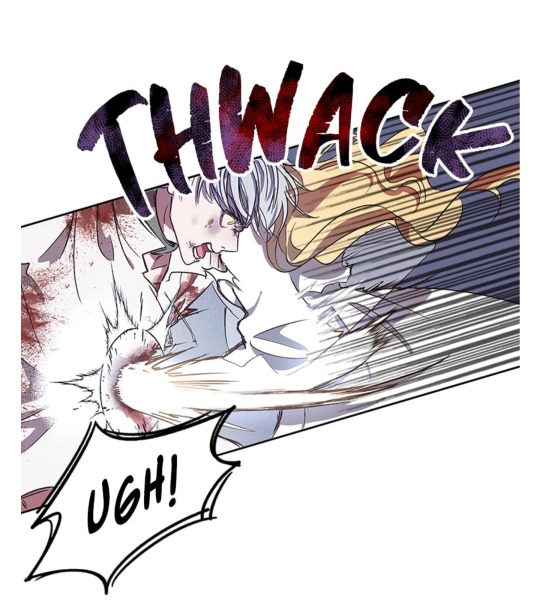
But in general I can't think of many other examples because the otome isekai prompt "I'm suddenly in a +18 dating sim game" is almost always written by someone writing rated-G material. It's pretty annoying. A good percentage of them have so little to do with the original porn story, it's unclear why that was even the premise, like there are teen rated dating games? Why make it about a porn game other than to underline how innocent and pure the main character is. Even the two I'm praising aren't actual porn. It's often a sign that I won't like the book.
Now, I've read a couple actual porn stories using the theme but tbqh they're not good and I'm not posting them. Recurring issue where you realize the mc was brought into a real, existing story that this author hated and said author will interrupt their own story to remind you how much they hate the first author for being such a trash ass hack fraud. Mid-coitus.
#roxana#i fell into a reverse harem game#the way to protect the female lead's older brother#protecting the female Lead's order brother#god i hate how many alternative titles there are for each story#otome isekai#regret not talking about Roxana even more what an unexpected gem#lmao let's read this cringe bs and laugh->HOLY SHIT LET'S GOOOO FUCKED UP TOXIC WOMEN STAY WINNING#if you're taking this from the tags dio or dex or w/e his name was is a dork and if you like him you have projected a cool yandere persona#that is not supported by himself#recommendations
98 notes
·
View notes
Text
I'm just thinking about Jonathan, a cheerful polite young man who's got all these people trying to steer him away from doom and praying for him in context of typical fable tales where the horrors are punishment for unjust evil people. I love how Dracula now here and later with Lucy subverses typical storylines by putting objectively 'undeserving' people through bad things
#this is way clumsier than i imagined in my head but whatever#putting 'undeserving' in quote marks bc the discussion on deserving punishment is way to complext to even start here#and i just mean how in fables there is usually some justice served on basis of current morality system#this was probably already said by someone#but god the trope of bad things happening to people regardless of any metric nothing protects us from tragic fate#i eat that shit up#dracula daily
19 notes
·
View notes
Text
i pray for people who mistake only being able to write genre-subversion for wisdom. your kino gene has been removed and the ability to perceive peak fiction has been extracted from your body
32 notes
·
View notes